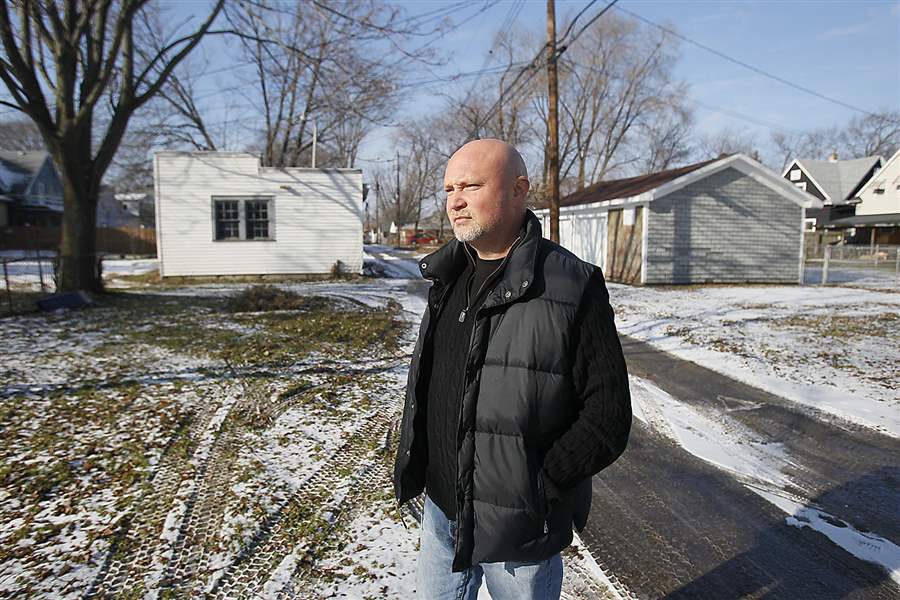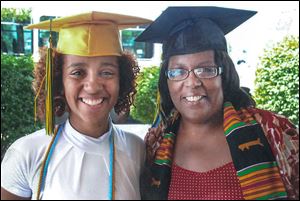
GENERATIONAL POVERTY: BREAKING THE CYCLE
Toledoans battle to reverse legacy of struggle, despair
12/29/2013
Greg Guzman’s family grew up on Prouty Avenue in Toledo’s Old South End, a poor neighborhood. A Bowling Green State University graduate, he’s been the president of Toledo’s Herzing University since 2010.
THE BLADE/JETTA FRASER
Buy This Image

Greg Guzman’s family grew up on Prouty Avenue in Toledo’s Old South End, a poor neighborhood. A Bowling Green State University graduate, he’s been the president of Toledo’s Herzing University since 2010.
First of three parts
Tracee Ellis’ father left home when she was 2, leaving her and two siblings behind with their mother. Her mother was a teacher for Toledo Public Schools, but back in the 1960s, women made a pittance compared to male teachers.
Greg Guzman’s father was an “obsessively hard-worker,” and yet his seven children and wife lived scrunched inside a small house in Toledo’s Old South End. Rain would gush through the leaky roof like waterfalls into waiting buckets placed throughout the two-bedroom house. Often, food was scarce.
“It was so cold in the winter, we would have to put on our winter coats just so we could use the bathroom,” said Mr. Guzman, 42, who is the president of Toledo’s Herzing University.
The stories of Mr. Guzman and Ms. Ellis are like many Americans who continue to fight for an escape from the cycle of generational poverty. It’s a cycle that can often be traced back three to four generations, said Dolores Rodriquez, a longtime family case manager for the Economic Opportunity Planning Association of Greater Toledo Inc.
“The first thing we need to get people to understand is that low income and violence doesn’t go together,” Ms. Rodriquez said. “That’s a stereotype. A common reason for poverty is education or lack of it. They drop out of school because they need to work and make money.”
The problem is the poor can only find minimum wage jobs that don’t pay enough to live on, she said. Or there are no jobs in their neighborhoods and they lack transportation.
Another reason is “bad parenting” or a household with only one parent, Ms. Rodriquez said. There’s a lot of pressure on single parents who are the major source of income and have all the parenting duties.
Children see economic struggles, an absent parent or parents, and start believing that’s the norm, she said.
“My own opinion is that the value of family and marriage is missing,” Ms. Rodriquez said. “How can I encourage my child to go to school if my parents never taught me the importance of doing well in school? There has to be a very strong woman, a mother who is there, to encourage them to go to school and college.”

Willis
Hardship, sacrifice
Ms. Ellis, 52, had plenty of support and role models growing up. Her parents, grandparents, and great-grandparents were all college graduates.
Her parents were both teachers who were recruited to come to Toledo and teach in Toledo Public Schools in the early 1960s, she said.
When she was 2, her parents divorced, and her father left to become a musician. Her mom had three young children to care for, including Tracee.
“Back then women, especially black women, didn’t make money comparable to other teachers,” Ms. Ellis said. “You see the problem started with divorce, not with young ladies having babies out of wedlock. That trend didn’t come until later.”
There were a lot of hardships and sacrifice, but Ms. Ellis’ mother made it possible for her children to attend college. She enrolled at Wilberforce College, where her parents, grandparents, and great-grandparents had graduated.
Despite the family’s legacy of education, she dropped out of college after a year and a half.
“I started doing other things,” she said. “I wasn’t disciplined enough.”
She returned to Toledo, and for the next 27 years she worked at menial jobs — housekeeper, hotel clerk, and waitress — and started having children.
In 1986, her first son arrived. Two more children followed in 1988 and 1990.
“The thing about it, I had studied the effects of generational poverty,” Ms. Ellis said. “I can remember periods when we didn’t have lights or heat. My mother was a proud woman, but there weren’t those kinds of resources.”

A family photo shows Tracee Ellis, right, and her daughter, Kayla Lindsey, at a joint graduation party in 2008. Ms. Ellis graduated from the University of Toledo in May of that year, and her daughter graduated from Start High School a month later.
Poverty line
Linnie Willis, executive director of the Lucas County Housing Authority, said that to understand the scope of the problem of poverty just look at one number — 146 million. Nearly half of all Americans are classified as living below the poverty line or as low-income, according to the latest U.S. Census figures.
There are many reasons why more people are living in poverty and staying there longer, Ms. Willis said. For example, more people are losing their jobs, there are more people with physical and mental disabilities who aren’t employable, and then there’s the working poor — people whose earnings don’t allow them to get out of poverty.
“It can happen in a number of ways or circumstances of birth,” Ms. Willis said. “I probably grew up in poverty and didn’t realize it. I had a single mom who married early and had three children.”
Despite her circumstances, Ms. Willis “realized that I didn’t want to live like that forever.”
‘Survival mode’
It wasn’t until 1990 that Ms. Ellis finally admitted to herself that she didn’t have any real marketable work skills. She was frightened for herself and her children.
“There was a period of time when I had no place to live; I was unemployed,” she recalled. “I tried to rent but couldn’t pay the rent. I didn’t want to stay with my mother because I would also be bringing three kids. I felt inadequate because I couldn’t provide for my children.”
Every day was a struggle to keep her children fed, clothed, alive.
“I was in survival mode,” she said. “Poverty is not just financial. It’s a mind-set that develops over time when you live that way day after day, trying to figure out where the next meal for your children is going to come from.”
Her break came in the form of the federal government’s Section 8 Rent Subsidy Program, which allows people to pay an amount of rent that is affordable. Because Ms. Ellis had no income, that meant she was paying no rent, which allowed her to begin working on a long-term plan.
“I don’t have a problem with people getting housing, food stamps, and other things that offer stability,” Ms. Ellis said. “But that’s where some people get stuck; you’ve got to have a plan. There are people living in government housing three, four generations. My mind-set kept me in poverty for 25 years.”
The Section 8 program is overseen by the Lucas County Housing Authority. The program provides subsidized housing for about 12,000 people in the county, said Ms. Willis, who has worked for the housing authority for 31 years.
“People think we just warehouse a person; that’s not true,” Ms. Willis said. “Those stereotypes aren’t accurate.”
The housing authority offers various programs that teach residents how to be more self-sufficient and make them aware of opportunities to better themselves, such as how to obtain their high school equivalency diploma or pursue a college education, Ms. Willis said.
“Nobody has ever said, ‘I want to be in poverty,’ ” Ms. Willis said. “But we have to do a better job of motivating people.”
Ms. Ellis knew what she had to do — get back to college after dropping out 26 years earlier.
It was challenging. She had to send her children off to school, then head to her own full-day of college classes. She also had a part-time job on campus. She received a bachelor’s degree in interdisciplinary studies, communication, and public service in 2008. In 2010, at the age of 48, she received a master’s degree in higher education.
Ms. Ellis now works for the city of Toledo as the the Block Watch Coordinator for the Toledo Police Department/Community Services. The job allows her the opportunity to work with the community to develop stronger retention programs and more accessible adult education services.
A family’s struggle
Mr. Guzman’s family grew up on Prouty Avenue, in Toledo’s Old South End. It was a neighborhood where the poor lived.
The family was barely making ends meet when his father, Gilbert Guzman, a longtime machinist, lost his job when the shop that had employed him closed in the early 1980s.
His father’s drinking problem grew worse after that, but he still managed to find some work. His mother, Patricia Guzman, found work cleaning office buildings.
“My father was an obsessively hard worker,” Mr. Guzman said. “He once continued going to work even though he had two broken ribs. He was an extremely intelligent man, not book smart, he was self-educated. He could always be found at the library reading.”
One question had always bothered Greg Guzman though: If his father was so smart and hard-working, why was the family always struggling financially?
He didn’t learn the answers until after his father died in 2007 at age 66.
The most shocking discovery was that he had sired several children with other women and was trying to take care of them all financially, Mr. Guzman said. And a lot of the family’s money was being used by his dad to buy booze, he said.
“My mother’s family used to mail her money, which she would hide so that we could have food to eat and clothes to wear,” Mr. Guzman said.
He also learned that his father had been smuggled illegally into the United States from Mexico when he was just a baby; apparently his parents thought he would have better opportunities in America, his son said.
Like many undocumented immigrants living illegally in America, Gilbert Guzman realized that he would never find a better-paying job unless he received legal permission to be in the country.
The right path
His father agreed to serve two tours of duty in Vietnam in exchange for his green card, which enabled him to stay in the country legally.
Despite the troubles at home, Mrs. Guzman tried to instill in her children the importance of obtaining a good education.
“My mom made sure we went to Catholic school,” said Mr. Guzman, who attended St. James Catholic until the eighth grade. He graduated from Central Catholic High School in 1989.
He credits the sisters at St. James for keeping him on the right path by using a combination of discipline, compassion, and love.
“We used to go trolling in the alleys, looking for bottles because that seemed like a lot of money,” Mr. Guzman said. “The sisters saw us but never said anything. Instead they would give us peanut butter sandwiches to take home for dinner.”
Mr. Guzman admits he has mixed feelings about his father.
“I admired him immensely for what he did teach me and also for what I learned,” he said. “Pursuing a college education came from the desire to not be like my dad.”
Greg Guzman didn’t have much help pulling himself out of poverty. He often worked up to three jobs to pay for his own college classes.
At the same time he helped pay for his brother’s and sister’s college classes and financially took care of his parents’ home.
He received a bachelor’s degree from Bowling Green State University in science and journalism and continued with a master’s degree in public administration with a specialization in economic development and planning.
After a series of job promotions, Mr. Guzman was hired as Herzing’s president in 2010.
Mr. Guzman no longer lives in poverty but admits all those years of struggling to get him and his family out of poverty resulted in a huge financial debt. He’ll still need to get his own children through college in the future, he said.
“I’m not living in poverty,” he said. “But I’m one misstep from being back to square one.”
It will all be worth if it, Mr. Guzman says, if it means that his son will be the first generation in his family to leave the grasp of poverty far behind.
“My father was sent to America to live with relatives in hopes that he would have a better life,” Mr. Guzman said. “Now things are better for my son. That’s how it’s supposed to be.”
Contact Federico Martinez at: fmartinez@theblade.com or 419-724-6154.